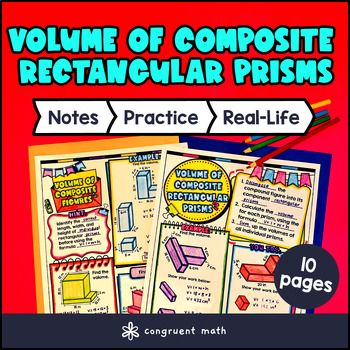Want more ideas and freebies?
Get my free resource library with digital & print activities—plus tips over email.
Join for Free Resources →
$4.25
Ever wondered how to teach volume of composite rectangular prisms in an engaging way to your 5th-grade students? In this lesson plan, students will learn how to calculate the volume of composite solid figures by decomposing right rectangular prisms and using the formula V = l × w × h. Through artistic guided notes, practice activities like color by code and a maze worksheet, students will gain a comprehensive understanding of finding the volume of composite rectangular prisms.
The lesson ends with a real-life example that explores how this math skill is used in storage management, showcasing the practical application of calculating the volume of composite rectangular prisms in everyday scenarios.

$4.25
After this lesson, students will be able to:
Before this lesson, students should be familiar with:
As a hook, ask students why understanding the volume of composite rectangular prisms is important in real life. You can use examples such as storage management. Refer to the last page of the guided notes as well as the FAQs below for ideas.
Use the first page of the guided notes to introduce the concept of decomposing composite solid figures of right rectangular prisms into individual rectangular prisms. Walk through the key points of breaking down composite rectangular prisms and emphasize the importance of understanding each part before calculating the total volume.
Continue with the second page of the guided notes to have students practice how to calculate the volume of individual rectangular prisms and then sum them together to find the total volume of the composite shape. Emphasize the formula V = l × w × h and guide students through applying it to each prism within the composite figure.
Based on student responses during the introduction, reteach the concept of decomposing composite rectangular prisms and calculating their volumes as needed. If there is a wide range of proficiency levels in the class, consider pulling out students for reteaching while more advanced students can begin working on the practice exercises later in the lesson.
Have students practice calculating the volume of composite rectangular prisms using the maze activity provided in the resource (pg. 3). Walk around to answer student questions.
Fast finishers can dive into the color by number worksheet activity (pg. 4) for extra practice. You can assign it as homework for the remainder of the class.
Using the last page of the guided notes, bring the class back together, and introduce the concept of storage management. Discuss how understanding the volume of composite rectangular prisms is crucial in real-life scenarios such as optimizing storage space in warehouses, packing boxes efficiently during relocation, or designing furniture to maximize storage capacity in small rooms. Refer to the FAQ for more ideas on how to teach it!
If you’re looking for digital practice for Volume of Composite Rectangular Prisms, try my Pixel Art activities in Google Sheets. Every answer is automatically checked, and correct answers unlock parts of a mystery picture. It’s incredibly fun, and a powerful tool for differentiation.
Here’s an activity to explore:
To calculate the volume of composite rectangular prisms, you use the formula V = l × w × h, where:
Decomposing composite solid figures involves breaking them down into individual right rectangular prisms that make up the composite shape. This process allows you to find the volume of each prism separately before summing them up.
Understanding how to find the volume of composite rectangular prisms is essential because:
To adapt this lesson plan for a digital learning environment:
Get my free resource library with digital & print activities—plus tips over email.
Join for Free Resources →